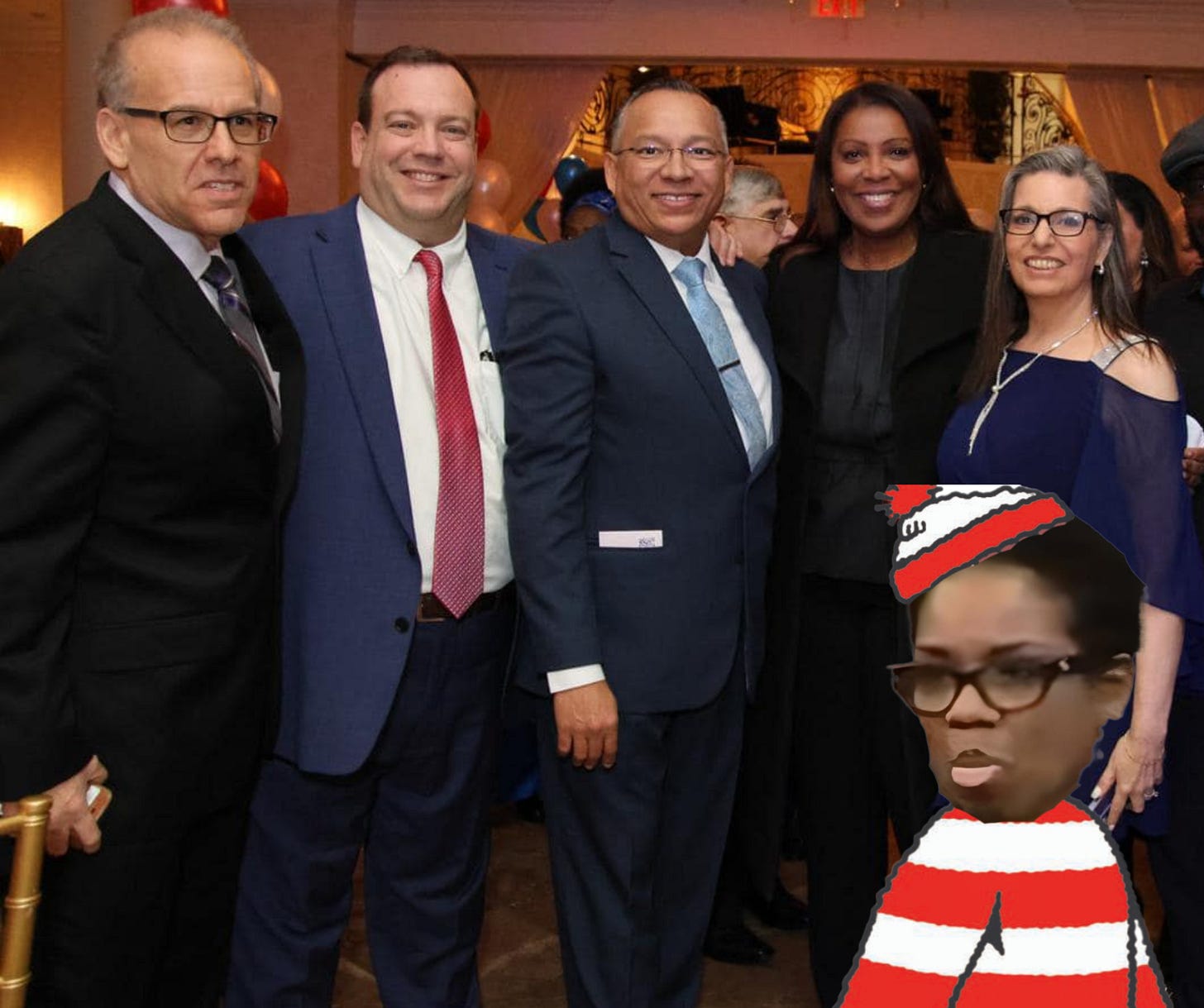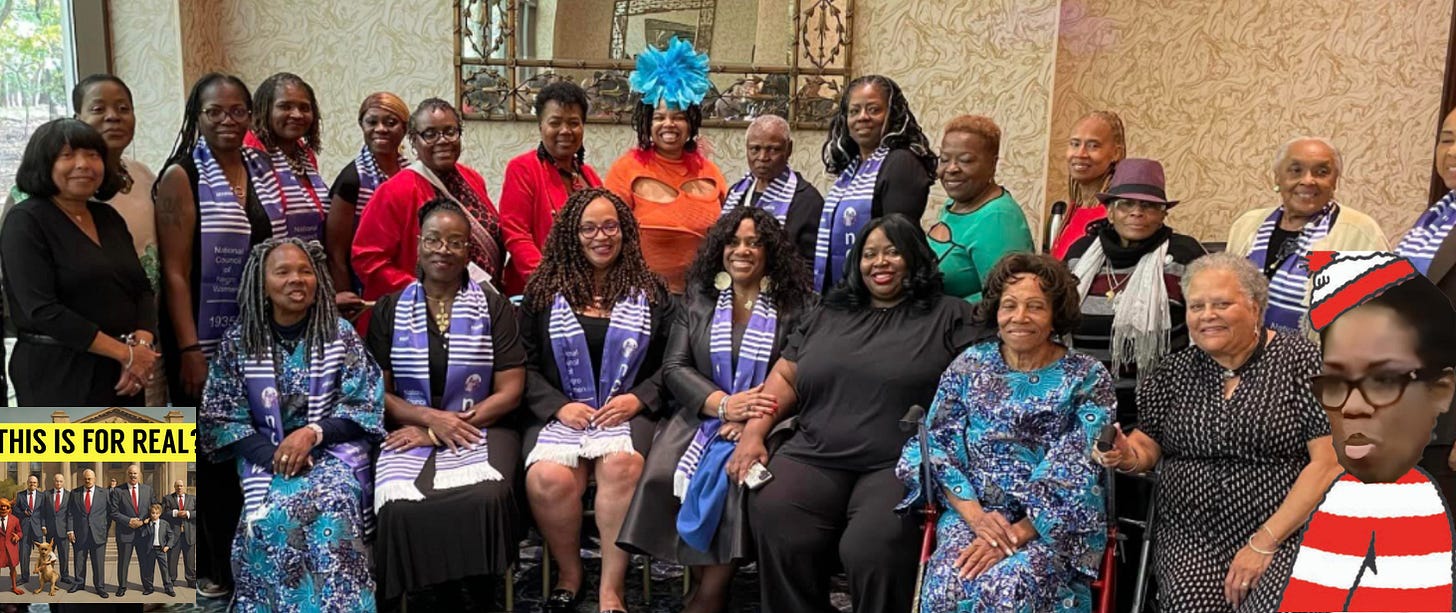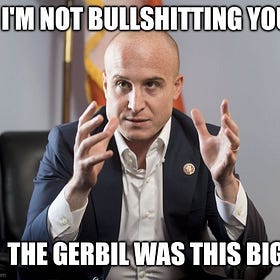Kamillah Hanks: NYC Council's 'Where's Waldo?'
Pol's Vanishing Act Leaves Political Future in Doubt
By Richard Luthmann
Kamillah Hanks' story is a cautionary tale. Once a promising leader, her missteps and betrayals have led to a dramatic fall from grace. Most do not expect her to recover politically.
This past week, Hanks' absence was notably felt at three significant events in her council district. The groundbreaking ceremony for the new $92 million community center, a Black History Month event, and the Staten Island Democratic County Convention proceeded without her presence. At these events, her predecessor, Debi Rose, stood where Hanks should have been, signaling a stark shift in local political allegiances.
Like "Where's Waldo?" Hanks was conspicuously invisible, a pointed symbol of her current political irrelevance.
The recent insightful analysis provided by Modern Thomas Nast On NYC Council Member Kamillah Hanks' Dramatic Self-Destruction laid out the intricate dynamics that led to her isolation.
Looking For A Dog? Kamillah Hanks Loses All Her NYC Political Friends
By M. Thomas Nast
In New York City politics, allies can be as fleeting as the seasons. Staten Island Councilwoman Kamillah Hanks seems to have taken to heart an age-old adage: "Nobody need want a friend who can get a dog." Attributed variously through history, this saying rings particularly true for Hanks, who is now a political leper.
Her absence from critical community events starkly illustrates Kamillah Hanks' fall from political grace, a tangible indicator of her isolation from the networks that once bolstered her career. As Staten Island progresses with new projects and community events, Hanks remains a sidelined figure, the victim of ambition, misjudgment, and political self-destruction.
The Break with Mayor Eric Adams
Hanks' fallout with Mayor Eric Adams marked the beginning of her end. According to Modern Thomas Nast, her "raspberries" in the NYC Council did not sit well with the Mayor, the NYPD, or the Law and Order establishment. Her support for the "How Many Stops Acts" law, increasing paperwork for police stops, alienated her further from crucial allies, including the Mayor and NYC Council Speaker Adrienne Adams. Her stance has alienated her from essential figures and institutions, marking her as a political pariah. She’s also wrapped in the middle of a Cultural Affairs scandal.
From NYC Public Safety Chair to Political Outcast: Kamillah Hanks' Demotion
By Richard Luthmann
From NYC Public Safety Chair to Political Outcast: Kamillah Hanks' Demotion Summary: In a stunning political shift amidst scandal, New York City Council Member Kamillah Hanks faces a demotion from her role as chair of the Committee on Public Safety.
Once allies, Hanks’ relationship with both Adamses deteriorated following her controversial decisions and public stances, starkly contrasting with the Mayor's policies and political strategies. Both Adamses wanted the “How Many Stops Acts" bill killed in committee.
A well-known NYC Democratic consultant quipped, "If she wants help from an Adams, she'd better have a séance with John and Abigail," highlighting her complete estrangement from current city leadership.
She was demoted to the head of a sub-committee on Landmarks. And even that role is in jeopardy because of her real estate developer partner’s ties to land use.
This rift culminated in Hanks' exclusion from essential city events, a clear signal from Adams and his administration that Hanks was no longer part of the inner circle of trusted politicians within New York City's political landscape.
Mayor Adams' disavowal of Hanks underscored the severity of her fall from favor, signaling to other political figures and the community that she was out of alignment with the current administration's goals and priorities.
Disconnection from the Black Community
Once supporters, the black community has also turned their backs on Hanks. Her betrayal, especially noted in her previous actions against Debi Rose, has left deep scars.
Hanks’ absences from Saturday’s Black History Month event at the Central Family Life Center and the Groundbreaking ceremony for the Mary Cali Dalton Center were not merely matters of scheduling conflicts or personal choices. She was told to “stay away.”
The new $92 million recreation center, named in honor of the Island’s former borough director of recreation, represents a substantial investment in the community's future, particularly for its youth and families.
Mayor Eric Adams, leading the groundbreaking, emphasized the transformative potential of such community spaces, suggesting that "Something magical happens when you allow children and families to have space."
This comment not only underscores the anticipated positive impact of the center but also subtly highlights the absence of any contribution or involvement from Hanks, once a pivotal figure in discussions about community development and youth engagement.
Each event from which she was absent served as a public stage for community engagement, political discourse, and the strengthening of alliances—all critical aspects of political life and leadership. Her absence speaks to a broader narrative of decline, a testament to her growing ineffectiveness.
Traditionally, such events serve as platforms to honor and recognize the contributions of the Black community, as well as a time for local politicians to connect with their constituents and celebrate cultural heritage. Mayor Eric Adams and Debi Rose’s presence underscored the event's significance and the community's ongoing efforts to acknowledge and celebrate Black history and significant community contributions.
However, Hanks' absence from these events was glaring. Once a prominent participant in such community gatherings, her non-attendance this year was a poignant reminder of her estrangement from a community she once actively engaged with and represented.
Now, Debi Rose takes Hanks’ place.
At the ceremony, the presence and words of Debi Rose, Hanks' predecessor, further underscore Hanks' fall from grace. Rose's reflections on the historical significance of the previous recreation center, which faced its downfall in 2010, serve as a poignant reminder of her long-term commitment and connection to the community.
Her statement, "When Cromwell first crumbled into the harbor, New York Harbor, in 2010, it signaled a devastating reality to the North Shore," not only evokes a sense of historical continuity and responsibility but also starkly contrasts with Hanks' current estrangement from community initiatives.
Last year, Hanks nixed Debi Rose’s appointment as a commissioner at the NYC Board of Elections, an act not forgotten nor forgiven. The Staten Island Democratic County Committee had voted to give Debi Rose the role. Hanks snubbed the S.I. Dems, Debi Rose’s supporters, and the entire community.
Now Kamillah Hanks is on the receiving end of multiple sunbs. Together, they add another layer to her political isolation, showing that her estrangement is not limited to political circles but extends to vital community relationships and events.
The Local Democratic Party's Cold Shoulder
Perhaps most telling is Hanks' isolation from the Staten Island Democratic Party, an organization central to the borough's political life. Her conspicuous absence from the Staten Island Democratic County Convention, a critical gathering for shaping the party's strategy and nominating candidates, underscores the extent of her political exile.
This event, which saw the participation of prominent figures and the launching of campaigns, proceeded without Hanks, highlighting her ostracization and toxicity within her own party. Such conventions are crucial for local politicians, offering a platform to showcase achievements, rally support, and solidify political alliances. Hanks' non-attendance was not just a physical absence but a symbolic representation of her vanished political influence and estrangement from the party's core.
In contrast to Hanks' situation, Debi Rose's presence at the convention was met with enthusiasm and support, highlighting her enduring popularity and respect within the party and community. The stark difference between the receptions of the two politicians underscores the significant shift in political allegiances.
Hanks’ once-promising political career now seems a distant memory as she faces the consequences of her actions, isolated from the power structures that once supported her ascent.
A prominent Manhattan Democratic Consultant's remark encapsulates the sentiment of abandonment surrounding Hanks and the contrasting communal embrace of Rose.
“No one likes Hanks. Everyone likes Debi Rose. She’s more popular than Santa Claus in Stapleton.”
Diminishing Support and Political Isolation: Hanks Joins Max Rose In NYC Dems Political Gulag
The repercussions of Hanks' actions reverberate beyond mere absence. It signifies a broader pattern of ostracization and political realignment. Former Congressman and S.I. Dems party vice chair Max Rose was also conspicuously missing last week, as they both were a couple of weeks earlier at a special event for New York Attorney General Letitia James hosted by County Chair Laura Sword.
Hanks’ decline in political fortunes parallels Max Rose’s.

Being told not to attend events, especially those involving prominent figures such as the NYS Attorney General, emphasizes the extent of the former congressman and current councilwoman’s fall from grace within the local party's hierarchy.
Max Rose, once seen as a bright star in the Democratic Party, has become increasingly alienated from the local Democratic establishment on Staten Island, much like Kamillah Hanks. His attempts to reclaim the congressional seat from Republican Nicole Malliotakis have been marred by this growing estrangement, reflecting deeper divisions within the local party dynamics.
Rosey Maxx, the Distinct Attorney, and Gerbil Armageddon on the Isle of Staten
Felching. It’s GERBIL ARMAGEDDON. And it appears to be the favorite pastime of the U.S. Congressional Candidate, at least when he is not PANDERING TO ILLEGALS, DEFUNDING THE POLICE, or INSULTING ITALIAN AMERICANS. He appears to be fully committed to the rodent love canal.
The Staten Island Democratic landscape has notably shifted, particularly in how the local party has moved its support from Max Rose to newcomers like Andrea Morse and Sarah Blas amidst broader strategic reassessments concerning the congressional district currently held by Nicole Malliotakis. The lack of unified support from his own party diminishes Max Rose's ability to present a cohesive and robust front against the incumbent.
As local political consultants and activists echoed, the prevailing opinion is deep skepticism regarding Max Rose's - or any Democrat’s - electability. The DCCC has already stated that they will not drop a dime into the 2024 race, the seat securely “deep red.”
A prominent Manhattan Democratic Consultant encapsulated the predicament.
"They say that most politicians are unbeatable unless they are found in bed with a dead girl or a live boy. But in Nicole's case, even if that were to happen, it would probably only help her popularity with certain segments of the electorate. She doesn't even have to campaign and will win re-election by 30 points out there."
Collective Distancing, Collective Embrace

The decision to exclude Hanks reflects a collective distancing by the party. The irony of Hanks' predicament is not lost on observers. Her self-sabotage has left her on the outskirts of the circles she once navigated easily. The political exile she faces is a testament to the swift changes in loyalty and support that characterize the volatile nature of New York City politics.
As for Debi Rose, her resurgence in the public eye and at community events hints at a possible political comeback. Drawing parallels with Gail Brewer's return to the NYC Council after serving as Manhattan Borough President, Rose's renewed visibility suggests she may be positioning herself for a future run, possibly reclaiming her seat in the 2025 council elections.
Even if Debi Rose elects to remain solely as a party elder and community leader, the road to the North Shore Staten Island City Council seat rolls through her camarilla.
“Debi Rose will decide who the next North Shore Council Member will be - and it’s not going to be Kamillah Hanks,” said a Staten Island Democratic County Committee Member.
Hanks’ rise to prominence was marked by a passionate commitment to community development, educational initiatives, and economic revitalization, particularly in areas that had long been overlooked or underserved.
However, the traits that propelled her into the public eye—determination, assertiveness, and an unwavering belief in her mission—ultimately contributed to her downfall.
With her political allies turning their backs and her district moving on without her, Hanks faces an uncertain future. The question now looms: Will she also be told to "stay away" from the Staten Island St. Patrick's Day parade, a crucial political event in her district? Her absence would further cement her fall from political grace and isolation from the community she once represented.

“It’s the most important day of the political year in the North Shore,” says a West Brighton resident and noted political operator. “It would be a shame if Kamillah and [her partner] Kevin Barry Love were told to stay home alone in Stapleton and cry into their Guinnesses.”
What do you think?











